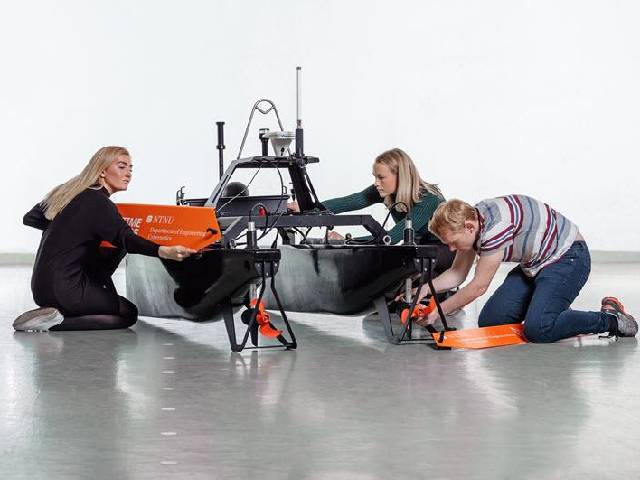The Norwegian Research Council has allocated NOK 2 billion to new centers for research-driven innovation. SFI Autoship, led by NTNU Department of Engineering Cybernetics in cooperation with SINTEF as key research partner, will receieve NOK 100 million over 8 years.
SFI Autoship will develop new knowledge, methods, tools, prototypes, technology and candidates for the Norwegian maritime industry. It will be a global hub for research and innovation on autonomous technologies and systems, with a special focus on safe and secure solutions.
The development of autonomous ships is receiving a lot of attention in the maritime industry, both nationally and internationally. SFI Autoship’s goal is to ensure that Norwegian participants take a leading role in this development, especially in regard of technology, business models and security.
SFI Autoship is starting this fall and has gathered 20 partners from the Norwegian maritime sector. The partners include end users, product and service providers, research institutions, universities and authorities. The center’s funding is over NOK 200 million over 8 years, where half is covered by the Norwegian Research Council and the rest is covered by the partners.
The center’s focus areas are:
- Innovations in enabling technologies, such as situational awareness, artificial intelligence, self-driving, digital infrastructure, remote operation, simulation and testing.
- New business models and operational concepts that look at the use of autonomous vessels in a bigger picture
- How to guarantee the safety and security of using autonomous ships
The research and innovation activities at the center will be a combination of long-term and basic research challenges across applications, along with short-term and applied end-user issues. An example of an end user’s need is project partner NCL’s wish to use autonomous ships to transport goods along the Norwegian coastline. Another example is Trondheim Municipality’s wish to explore the use of small autonomous passenger ferries as an alternative to bridges.
An important goal for the center is to educate new candidates with the right expertise for the maritime sector, aiming for a minimum of 150 candidates with a master’s degree, 20 PhD-candidates and 4 postdocs. A key ambition is to contribute to a better gender balance in the maritime sector.
– We want to contribute to making Norway a leading nation within solutions for autonomous ships. We are doing that by using the potential in a longterm cooperation between universities, research institutions, industry and authorities. We want to contribute to developing new jobs, both directly and indirectly, says Mary Ann Lundteigen, NTNU Professor and manager of SFI Autoship, to the Norwegian magazine Teknisk Ukeblad.
The SFI Autoship partners are: NTNU, SINTEF Ocean, SINTEF Digital, UiO, IFE, Sjøfartsdirektoratet, Kystverket, Trondheim havn, Trondheim kommune, Kongsberg Gruppen, DNV GL, Telia, Massterly, Embron, Maritime Robotics, Idletechs, Equinor, G2 Ocean, Grieg Star, NCL, Gard, Torghatten, MacGregor.









































